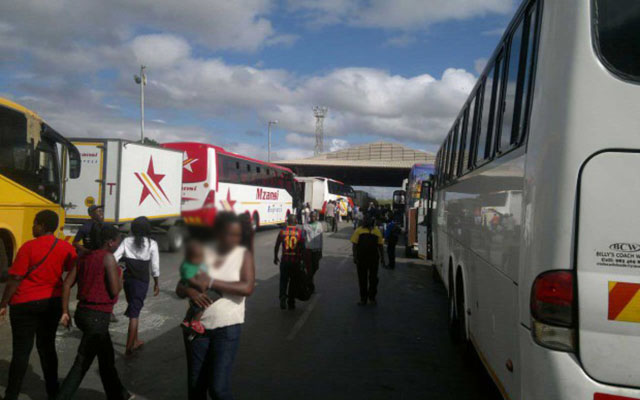Govt restores rebate for all

Daniel Nemukuyu: Senior Court Reporter
Travellers in buses towing luggage trailers are now also entitled to $200 rebate on Customs and Excise duty enjoyed by their peers who use private vehicles and buses without trailers. Government, in line with the Constitution, recently amended Statutory Instrument 148 of 2015 which took away that privilege from people travelling in cross-border buses towing trailers.
In terms of SI 148 of 2016, travelling in a bus drawing a trailer automatically classified one as a trader, who was not entitled to enjoy the privilege of the rebate.This was despite the fact that 90 percent of cross-border buses tow luggage trailers because there is another legal requirement barring the use of traditional rooftop luggage carriers.
Cross-border transport operators and travellers queried the discriminative implications of the law and lodged complaints with the Ministry of Finance and Economic Development. They cried foul over loss of business as travellers were now shunning their buses.
Read more:
- Rebate law sparks legal dispute
- Indigenisation: Govt plans to introduce rebates
- Govt slashes travellers’ rebate
Among the most vocal groups was Jay Jay Travel and Tours, which wrote to the ministry arguing that the law was discriminatory and unfair on the part of bona fide travellers who found themselves in buses drawing trailers.
Through SI 126-2016, gazetted on October 21 this year, Finance and Economic Development Minister Patrick Chinamasa amended the law to ensure travellers are not discriminated based on the type of vehicles they use when crossing borders.
Minister Chinamasa amended Section 114 (4) (k) of SI 154 of 2001 and inserted a new provision that ensures genuine travellers are not adjudged to be traders based on the mode of transport they use when crossing borders.
The proviso reads:
“Provided that this subsection shall not apply to goods imported by bona fide travellers and are being imported in trailer drawing omnibuses and other passenger carrying vehicles drawing trailers”.
This means if one is a genuine traveller, he or she is entitled to the $200 rebate on duty despite the type of transport used.
In terms of SI 148 of 2015, travellers in private vehicles and those in buses that do not have trailers can enjoy the rebate on their imported goods at the borders, but those in buses pulling trailers are regarded as traders who are not entitled to the rebate.
Jay Jay Travel and Tours, which operates cross-border buses, instructed its lawyer Mr Alex Majachani of Mberi Chimwamurombe Legal Practice to write to Minister Chinamasa. The lawyers threatened to sue Government over the piece of legislation if the Statutory Instrument was not struck off.
Government promised to look into the matter and respond to the transport company. Instead of responding to Jay Jay, Government resolved to amend the law for the benefit of the genuine travellers and all the transport firms. The company wanted Government to revisit the law and amend it or completely remove it from the statutes.
In a letter of demand authored by Mr Majachani, Jay Jay Travel and Tours gave the Ministry of Finance a 14-day ultimatum to either struck down the law or to amend it in line with the supreme law of the country.
“Should we not hear from your ministry within 14 days of receiving this letter on positive steps to repeal and or amend the Statutory Instrument to align it with the Constitution and or the parent Act, our client shall approach the court for redress of this matter without further notice to you,” reads the letter dated May 26 2016.
The lawyers argued that the company only resolved to tow trailers in pursuance to a law that barred the use of rooftop luggage racks.
“We hasten to state that the trailers were put in place because of the 2011 Bilateral Agreement (between Zimbabwe and Botswana), which scrapped the placement of luggage on the bus roof.
“Ironically, these trailers have now become the source of economic problems for our clients and other citizens in light of the provisions of the recently promulgated SI 148 of 2015,” the letter reads.
Jay Jay Travel and Tours said it was now losing business as passengers are opting for buses without trailers.
“Our client’s coaches have always drawn trailers for the convenience of its customers’ luggage. This circumstance has resulted in our client gradually losing out business to coaches that do not have trailers or to small transporters who are now picking up travellers to the border post, so that they will be treated as pedestrians in terms of the statutory instrument,” the company said.
The lawyers contended that the statutory instrument was in violation of the people’s right to equal protection of the law as enshrined under Section 56(1) of the supreme law. It was also the lawyers’ argument that the same law had an effect of discriminating people basing on economic or social status.











Comments